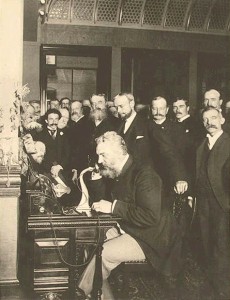More than a century ago, Alexander Graham Bell recorded his voice on a waxed cardboard disc at a laboratory in Washington DC. This week, we got to hear this scratchy recording—and Bell’s voice—for the first time.
Much of the recording involves Bell counting. He counts all the way up to 50, carefully enunciating each numeral. And then he begins counting by 10s. Then by 100s. Next comes a list of thousands. Then ten thousands. Then hundred thousands. Then he starts listing random numbers, like 4,530,870. Then . . . . zzzzzzz. I’m sorry. I fell asleep a little. It’s really boring. He enumerates for nearly four minutes.
Carl Haber, one of the scientists who helped extract Bell’s voice from the tattered disc, notes: “In those days of Edison and Bell, they thought recording was going to be important for accounting purposes or keeping business records. They may not have originally considered recording music.” Maybe that’s not quite true; an earlier phonograph recording did capture the sounds of a cornet. But there’s no doubt that when a technology is brand spanking new, we often have trouble predicting its usefulness.
 Case in point: Soon after Bell invented the telephone, a Western Union internal memo reportedly advised: “This ‘telephone’ has too many shortcomings to be seriously considered as a means of communication. The device is inherently of no value to us.”
Case in point: Soon after Bell invented the telephone, a Western Union internal memo reportedly advised: “This ‘telephone’ has too many shortcomings to be seriously considered as a means of communication. The device is inherently of no value to us.”
And who could have predicted the many applications of the internet? When I first got online as a freshman in college, I had no idea how to use it. I harnessed the power of the web to join a Billy Joel fan club. And then I visited the home page of the movie remake of Romeo & Juliet starring Leonardo DiCaprio and Claire Danes. (Remember that movie? They talk like Shakespeare but live like gangsters.)
And then I was out of ideas. I couldn’t imagine any other use for this network. And no doubt CERN’s Tim Berners-Lee, who developed the web two decades ago as a tool to help scientists around the world share information — Happy birthday, World Wide Web! — never imagined I’d be using his technology to ogle Leonardo DiCaprio. Or buy cardigans. Or blog about Alexander Graham Bell. Or tweet. Or any of the other million and one uses I find for the internet every day.
But no matter what new technology arises, I think we can safety predict that it will, at some point, malfunction just as Graham Bell’s recorder seemingly malfunctioned in 1885. And we all know how frustrating that can be. Right before the first part of Bell’s record ends, Bell makes what Haber describes as “a clearly disappointed exclamation.” (Go to this video and fast forward to 2:45). I’ll let you judge for yourself what Bell is saying. To me it sounds an awful lot like “Oh f&%$.” I’m sure we can all relate.
***
Image courtesy of Wikimedia commons
You’re right — the inventors of new technology rarely can imagine what the adopters will come up with to tweak it. Case in point, when the desktop personal computer was first invented, desperate marketers told ladies that a computer was ideal for storing recipes!
I think the bottom line here is that everyone should read more science fiction.